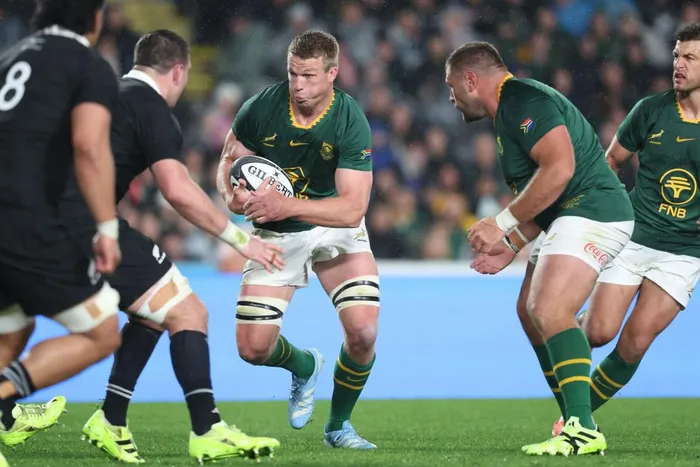Veteran Pieter-Steph du Toit embraces new Springboks' evolution under Rassie Erasmus
Rugby

Springbok bruiser Pieter-Steph du Toit takes the ball up in their Rugby Championship match against the All Blacks at Eden Park.
Image: Michael Bradley / AFP
At the start of the year, Springboks coach Rassie Erasmus put his players through gruelling fitness and performance tests.
The first round took place during their opening camp in Johannesburg, where the players were pushed to a “dark place” during their assessments. Veteran wing Cheslin Kolbe described it as the toughest pre-season camp he had ever experienced.
It was the first time since his appointment in 2018 that Erasmus had introduced such demanding evaluations at the beginning of a season. By conducting these gruelling tests, Erasmus was assessing his senior players to determine whether they could still meet the physical demands of Test rugby at the highest level.
But the purpose went beyond endurance. He also wanted to see if his veterans possessed the conditioning required to play a different brand of rugby — one that not only demands the familiar physicality and brutality associated with the Boks but also incorporates a more expansive running game.
Over the past 18 months, the Boks have been working to evolve their style, recognising that pragmatic kicking and suffocating defence alone won’t be enough to secure another World Cup title. That’s why Erasmus brought in former All Blacks fly-half Tony Brown as attack coach—to equip the team with the tools to play with greater variety and tempo.
With this shift, fitness levels must be matched by sharper skill sets. Forwards, in particular, are now required to move the ball quickly through crisp passing and accurate offloading.
It’s a complete mindset change from the old approach — where players often had their heads down and simply drove into contact. Now, they must scan the field, read the situation, and decide whether to pass, offload or carry.
So far, it’s been a promising evolution: the process solid, the progress steady.
One player clearly thriving under this new philosophy is star flanker Pieter-Steph du Toit, who has transformed from a hard-hitting enforcer into a dynamic operator in the wider channels, showcasing deft passing and intelligent support play.
“(The new skills) are definitely something we’ve been working hard on. Every player has his own priorities — what we call ‘extras’,” Du Toit explained. “Tony spends an unbelievable amount of time helping us. We know what’s expected — when the ball comes, you must be ready to handle it and know exactly what to do with it.”
Aside from the second-half collapse at Ellis Park against the Wallabies, the Boks have looked significantly fitter this year and have finished matches strongly. Their performances against the All Blacks in Wellington and Argentina in Durban are prime examples — games where they overwhelmed their opponents in the closing stages.
Du Toit said the team had shifted its focus towards ball-in-play training, which the players have found both challenging and enjoyable — a welcome change from the brutal fitness sessions earlier in the year.
“Over the last three weeks we’ve added more ball-in-play work to our practices, which is more game-simulated, and the guys are really enjoying it,” he said.
“This whole year there’s been an emphasis on our fitness. In the past, we never used to do that kind of work, and it’s the first time we’ve focused on it properly. “It’s something new for us and something we’re constantly improving on, because fitness doesn’t just come on its own.”
Veterans like Du Toit have seen it all in the green and gold, having lifted the last two World Cups. But as many of them move towards the twilight of their careers, they’re energised by the enthusiasm of the younger generation breaking through.
Talented youngsters such as Sacha Feinberg-Mngomezulu are blazing a new trail, and Du Toit says the experienced players are feeding off that energy.
“It’s great to see the passion and energy the young guys are bringing into the team,” said Du Toit. “They’re fast and make quick decisions, which is a good thing — they bring that extra oomph to the team.
“It’s not that the older guys don’t have it, but that’s just the reality of time. Still, everyone knows the team comes first, and if a young player is performing well, the best player must play.
“In the past, Rassie said that if the team wins, the individuals win too — and that’s still true today.”
Related Topics: